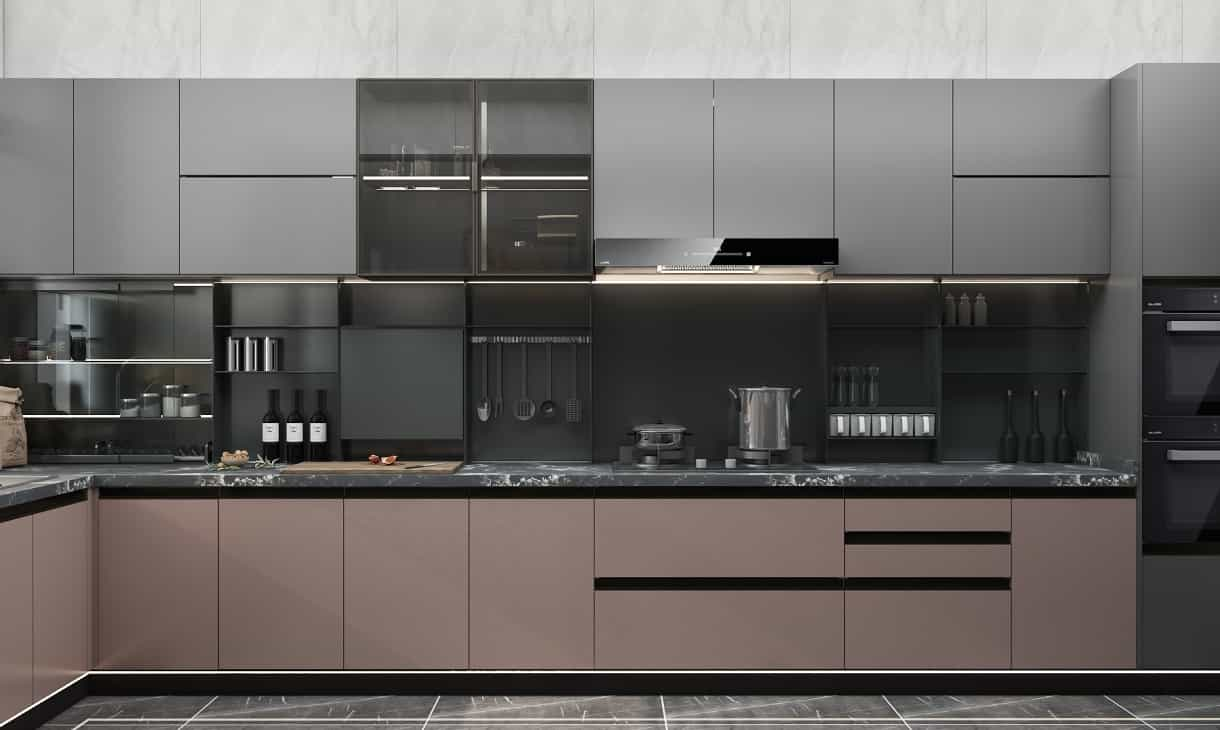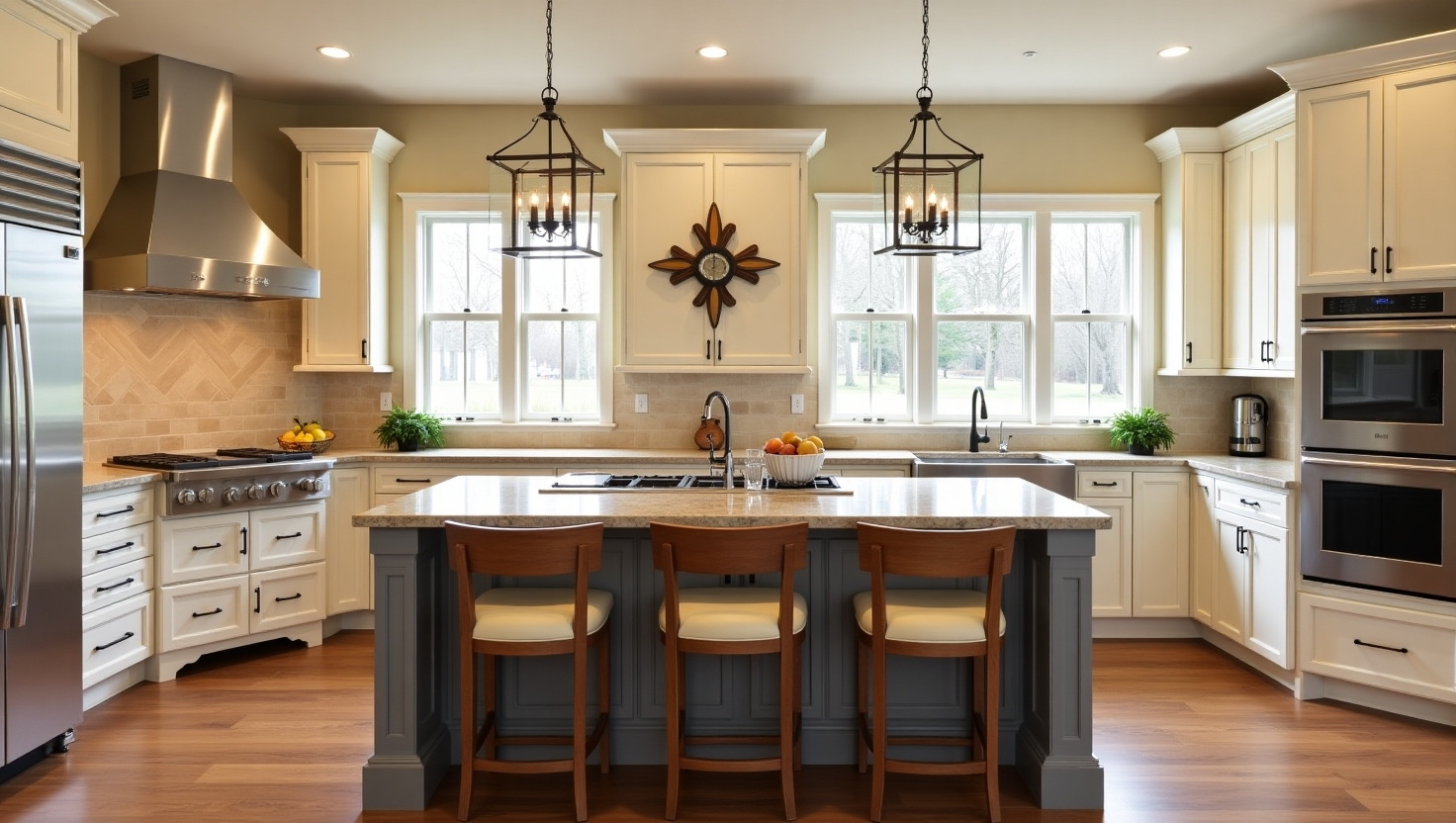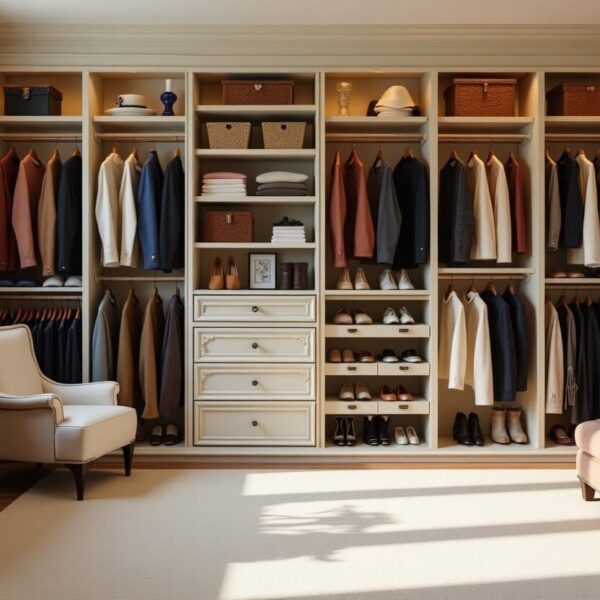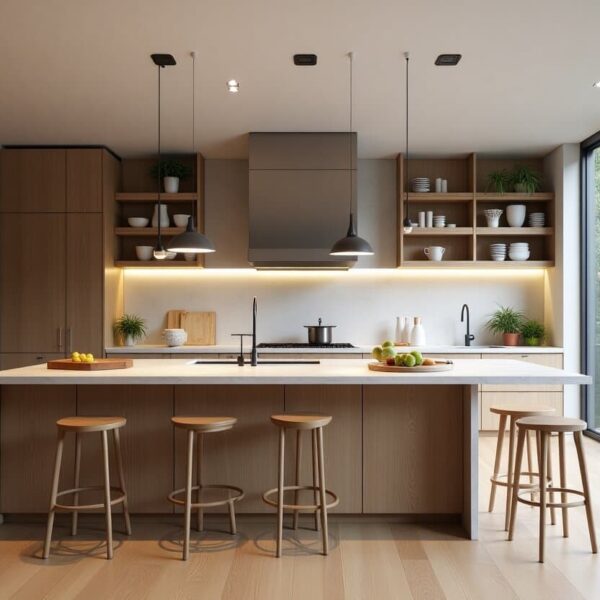Sourcing a custom kitchen cabinet from China is incredibly appealing for homeowners, interior designers, contractors, and real estate developers. With its competitive pricing, wide range of options, and unmatched customization potential, China continues to be the go-to hub for kitchen cabinet manufacturing. But here’s the catch: not every Chinese kitchen cabinet supplier is the real deal.
Choosing the wrong partner can lead to project delays, quality issues, and even complete financial loss. This blog will serve as your guide to spotting red flags, verifying factory legitimacy, and choosing the right kitchen cabinet manufacturers in China for your next project.

Signs of a Genuine Custom Kitchen Cabinet Manufacturer
Reputable Chinese kitchen cabinet manufacturers and custom kitchen cabinet from China manufacturers leave a clear trail. Here’s what to scrutinize when vetting potential partners:
Brand History & Industry Standing
Authentic brands proudly display their full development history on official websites, often with significant milestones. In contrast, “fake foreign brands”—which might use European-sounding names but are actually small local operations—will lack any genuine historical depth or verifiable track record. To confirm their legitimacy, cross-reference their business registration information, especially through China’s National Enterprise Credit Information Public System. This will provide irrefutable proof of their legitimate establishment and operating history, helping you distinguish between a genuine kitchen cabinet manufacturer in China and a mere front.
Depth of Supply Chain Integration
Vertically integrated companies, those that control more steps in their production process, often produce core components like hinges and drawer slides in-house. This significantly cuts down on outsourcing costs and ensures consistent quality. When you’re talking to a potential supplier, ask for the names of their component sub-suppliers. Even better, if feasible, request a virtual or in-person tour of their component production lines. A truly integrated and genuine China custom furniture manufacturer will be transparent about these capabilities, as it’s a key part of their value proposition.
Pricing Logic & Minimum Order Quantity (MOQ)
Genuine factories typically offer flexible Minimum Order Quantities (MOQs), often starting from as little as 1 linear meter, and provide clear, tiered pricing (for example, basic options might range from $50–$120 per meter). Trading companies, on the other hand, frequently demand high MOQs and will flat-out refuse small orders, which is a strong indicator they’re just intermediaries. Always compare their MOQs with similar factories listed on platforms like Alibaba. Don’t hesitate to ask for a detailed breakdown of cost components; a legitimate kitchen cabinet manufacturer in China will be able to clearly explain their pricing structure based on materials, labor, and overhead.
Completeness of After-Sales System
Reliable companies have a structured and robust after-sales service system in place. Fraudulent brands, however, often depend on unreliable third-party service providers or offer vague, unbacked assurances. Test their responsiveness by calling their after-sales hotline. Request a list of their overseas service points or details about their international warranty network. A comprehensive after-sales system is a hallmark of a committed and trustworthy supplier.
Have a project in mind? Send a message.
Get the catalog for free
Industry Reputation & Export Data
A real Chinese kitchen cabinet maker will have verifiable export records and a portfolio of successful international projects. Ask for copies of recent (e.g., from the past three years) Bills of Lading (BLs) or request client testimonials and recommendation letters. You can also cross-verify their export activities through publicly available data from sources like China Customs. This data provides concrete evidence of their experience and reliability in global trade.

Common Scams & How to Respond
Navigating the world of custom kitchen cabinet from China can be tricky, as dishonest suppliers often use deceptive tactics to hide their true nature. Being aware of these common ploys and knowing how to counter them is crucial for securing a reliable Chinese kitchen cabinet supplier.
You might want to watch out if they dodge video calls, if different contacts provide contradictory information, or if they delay providing crucial documents like production schedules. These could often be signs they’re trying to conceal issues like subcontracting your order to smaller, unauthorized workshops, insufficient production capacity, or even questionable material sources. To combat this, it’s often advisable to insist on a single, dedicated point of contact for all communications. You might also consider explicitly stating in your contract that critical inquiries should be responded to within 48 hours. For added transparency, asking for weekly photo or video updates (with date watermarks) of your order progressing on the production line can be very helpful. A legitimate kitchen cabinet manufacturer in China will likely be happy to provide this visibility.
It’s wise to be wary of claims that custom kitchen cabinet from China orders can be delivered in an impossibly short timeframe, like “15 days.” This usually suggests they’re just reselling refurbished stock, not genuinely manufacturing new custom units. To expose this, you could request a production log for your custom order; a genuine factory simply cannot complete a customized order in such a short time. Another common trick is claiming “German quality requires local fine processing,” subtly implying they have a factory in Europe. To verify this, you might ask for their claimed European factory’s VAT number and local logistics warehouse entry records. Keep in mind, genuine European manufacturing cycles typically exceed 120 days. It’s also worth looking out for significant and inconsistent fluctuations in delivery times for different items within the same batch; this often reflects unstable outsourced production. To counter this, requesting a Gantt Chart or a detailed production timeline for your multi-batch orders could help expose any coordination chaos.
You might often hear vague excuses like “customs inspection” or “shipping schedule adjustments” for persistent delays. To cut through the ambiguity, it can be beneficial to demand the Container No. so you can track it in real-time on the shipping company’s official website (e.g., Maersk). Additionally, verifying if the Bill of Lading (B/L) indicates a direct port-to-port shipment is good practice. A major red flag could be when they only provide a freight forwarder’s receipt (not an actual shipping company’s B/L), or if they become vague and evasive when you ask for specific details about the shipping route.
A genuine kitchen cabinet supplier in China will typically provide a clear basis for their capacity calculations (e.g., “7 days added production time due to spray line capacity limits”) and will precisely calculate sea freight based on the cubic meters (m³) of your order. In contrast, trading companies often make vague promises like “guaranteed on time” and broadly charge a flat 15-20% of the order value as “international shipping fees” without a detailed breakdown. You might use online freight calculators (e.g., Maersk freight calculator) to input the distance from your destination port to the Chinese departure port and cross-verify their claimed sea freight costs. For real custom kitchen cabinet from China orders, sea freight typically accounts for 12-18% of the total order value. It’s important to be extremely wary if a “fake import” claims this cost exceeds 25%, as it often signals hidden markups or deceptive practices.

Common Disguises of Trading Companies
When sourcing custom kitchen cabinets from China, it’s crucial to understand how some trading companies try to appear as direct kitchen cabinet manufacturers in China. Their tactics can be subtle, designed to obscure their role as intermediaries and inflate costs.
Trading companies often employ fake foreign brand marketing, using European or Western-sounding names to suggest a higher quality or more direct connection to design trends. In reality, these might just be small local workshops operating under a deceptive brand. Another common tactic involves subcontracting and material substitution. An agent might secure an order and then secretly pass it on to a smaller, often less reputable, workshop, subtly replacing the agreed-upon cabinet materials with cheaper alternatives to maximize their profit margins. This can severely compromise the quality and longevity of your custom kitchen cabinet from China. Furthermore, be wary of unsupported warranties. They might promise a “5-year warranty” but lack any actual after-sales system to back it up, or claim “ten times compensation for fakes” while cunningly evading responsibility by simply self-labeling products to avoid accountability.
A very prevalent disguise involves their “modular costing” or bundled quotes. A trading company might offer a single, all-inclusive price per “module” (e.g., “$4,200 RMB per linear meter including countertop”) and then refuse to provide a detailed, itemized material breakdown. They might vaguely claim to use “European standard hardware” without specifying brands or models. The hidden risk here is significant: the labor costs in such bundled prices often exceed 40% (whereas in a genuine factory, they are typically below 25%). This inflated labor cost is a strong indicator of multiple layers of markups for reselling, revealing that you’re paying for several intermediaries, not just direct production from a Chinese kitchen cabinet supplier.

6 Signals of a Genuine Factory
Not all kitchen cabinet suppliers in China are created equal. While many trading companies present polished brochures or boast international-looking websites, what really matters is whether they own and operate their own production lines. If you’re trying to avoid the pitfalls of dealing with a middleman, here are six subtle yet powerful clues that indicate you’re working with a legitimate manufacturer—not just a reseller with a flashy pitch.
The first thing to look for is the supplier’s willingness to accept small, trial orders. Genuine cabinet factories usually have flexible production capabilities and understand that international buyers often want to test quality and finishes before placing larger orders. If the supplier is comfortable producing and shipping even 1–3 full sets of cabinets, that’s a strong sign of a real production setup. In contrast, trading companies tend to push for high minimum order quantities, as they lack in-house manufacturing and rely on batch production from subcontractors.
Another important indicator is how detailed their quotation is. Real manufacturers will provide itemized quotes that break down every cost—cabinet carcass materials, door panel finishes, hardware brands, accessory upgrades, and even labor or packaging. This level of transparency shows that they are in control of their supply chain and costing. If a supplier avoids breaking down costs and only offers a per-meter “all-inclusive” price, chances are they’re hiding something—or they don’t even know their true material inputs.
A real factory also won’t bait you with “free design” promises. Instead, they’ll likely charge a modest but meaningful design or drawing fee, typically ranging from ¥500 to ¥2000. This charge covers the development of production-ready technical drawings or 3D renderings by their in-house design team. By charging a fee, they show they value the design process—and you gain ownership of the drawings, which adds protection and professionalism to the collaboration.
Another way to tell the real from the fake is to ask about pricing flexibility with order volume. Authentic cabinet manufacturers operate on economies of scale and will gladly explain how costs decrease as quantity increases. For example, the per-linear-meter cost of a 10-set order may be notably higher than that of a 100-set order due to material batching, labor allocation, and process efficiency. A flat price across quantities, with no discount for bulk, is a strong sign you’re not dealing directly with a factory.
Technical upgrades are also revealing. If the supplier can clearly quote the added cost for premium materials—such as anti-fingerprint laminates, UV lacquered finishes, or branded hardware like Blum or Hettich—this suggests they are deeply involved in production and material sourcing. Real factories treat these features as modular add-ons. Meanwhile, traders often use them vaguely, citing “European standard hardware” without specifying brands or pricing.
Finally, payment structure says a lot. Reputable manufacturers will usually offer phased payment terms, such as 30% upfront to confirm the order, 50% upon completion of mass production, and the remaining 20% after inspection or before shipment. This approach demonstrates operational maturity and transparency, protecting both parties. On the other hand, a demand for full payment up front — or unusually large deposits with no built-in production checkpoints—should be a red flag.
Taken together, these clues reveal far more than a company’s website ever will. If a supplier accepts flexible orders, provides transparent breakdowns, supports design with internal resources, explains pricing logic, itemizes upgrades, and offers staged payments—you’re most likely working with a real kitchen cabinet manufacturer in China.

How to Protect Your Investment
Before Signing:
Request a complete timeline of historical orders (production → port arrival). Verify that the container tracking and Bill of Lading issuer match the actual shipping company. Stipulate in the contract that “all materials are directly supplied from original manufacturers,” with a penalty of deposit forfeiture for breach.
During Production:
Demand weekly node photos (with date watermarks of workshop production status). Utilize phased payments: 30% deposit + 60% upon goods arrival and inspection + 10% after installation completion.
After Delivery:
Analyze logistics costs: True custom kitchen cabinet from China manufacturers’ sea freight usually accounts for 12-18% of the total price (beware if “fake imports” claim >25%).

Verify First, Trust Later
A genuine Chinese Kitchen Cabinet Supplier will not evade any questions you ask. Taking the time to investigate upfront is far more effective than seeking recourse afterward. Carefully identifying authentic manufacturers is a critical prerequisite for successfully completing your project.
We are a genuine kitchen cabinet factory in China, with over 10 years of high-end customization experience. We provide end-to-end services from design deepening and sample production to mass manufacturing and export packaging for global clients. We particularly excel in meeting the demands for American, modern, and minimalist style custom kitchen cabinets from China.
Welcome to contact Nexthome Furnishing – making your cabinet procurement more secure and efficient.
Contact NextHome Now!
We are here to help you with your business needs. We have a team of experts who are always eager to help you.



